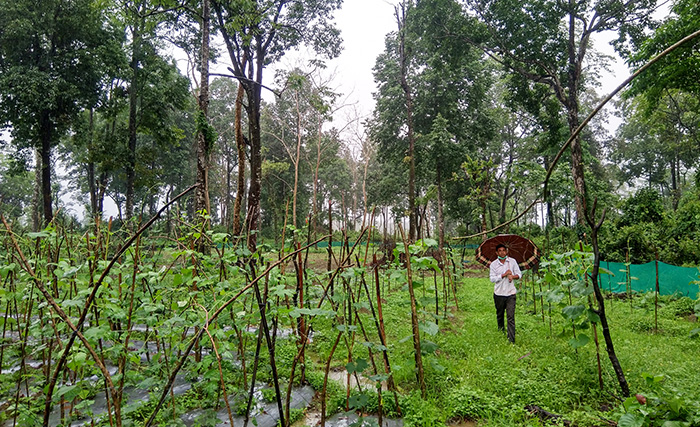Many interested in expanding
Nima | Gelephu
Kamana and her husband may not thank the Covid-19 pandemic, but it has helped them find a solution to a problem that the couple had been trying to resolve for the past two years.
The couple, who are already into commercial farming wanted to expand their farm. They wanted to take government land on lease. But after running from one offices to another to complete unending procedures, they couldn’t complete the paper works.
“For the new ones taking up similar farming plans it would be discouraging. Land are leased easily for livestock-related activities but it is difficult when it comes to agriculture,” said Kamana.
However, the government’s prioritisation of agriculture for food self-sufficiency post Covid-19 pandemic has come as a blessing in disguise for Kamana and her husband, Purna Gurung.
They were allowed to expand their farming on 3.7 acres of government land which was left fallow right next to their farm called PK Organic Farming. The farm spreads over seven acres of land today.
Kamana is planning to use the new plot to venture into mechanised farming that could be seen as a model farm for many aspiring to take up commercial farming.
Started with support from the priority sector lending scheme, the farm produces vegetables worth Nu 500,000 annually. PK organic farm focuses on producing banned vegetables like cauliflower, beans, and chillies, especially during the winter.
“It is challenging to get government a land for commercial farming. I have land in my village but it’s too far from the town and the accessibility is a problem,” said Purna Gurung.
He added it was difficult to develop required infrastructure for farming on private lease land as it comes with obligations from the owner.
“There is no security because the maximum agreement term is for five years. If the owner does not renew after five years, we have to move to another plot, which would be a huge discouragement and loss,” said Purna Gurung.
It takes almost five years to properly develop acres of fallow land into cultivable land and to start producing vegetables.
In the wake up to the Covid-19 pandemic, over 146.13 acres of land were brought under cultivation in Sarpang, according to the dzongkhag agriculture sector.
Another farmer from Samtenling, Deepak Chhetri was also allowed to expand his commercial farming into another five acres of land in the gewog.
Within 45 days, the 43-year-old farmer has converted the fallow land into a farm that is ready to produce vegetables like chillies, beans, and cucumber in the next few months.
Over 100 people, groups, and individuals have approached the agriculture sector, requesting land on lease to start commercial farming so far.
The agriculture sector has identified close to 700 acres of potential fallow land for commercial farming, which would be provided with possible mechanisation support and required inputs from the government.
Dzongkhag agriculture officer, Deki Lhamo said the sector discourages providing government land on lease to revive fallow land.
Over 70 acres of Government Reserve Forests (GRF) land were provided to individuals and groups interested in commercial farming and close to 30 acres were cultivated to date, according to the official.
The dzongkhag produced over 1,288 MT of vegetables in 2018-19. Today Sarpang has over 350 acres of land under vegetable cultivation, including back yard, semi-commercial and commercial farming.
Deki Lhamo said the dzongkhag is a hub for winter chilli and vegetable production. “We are focusing on educating growers on organic aspects and encouraging the construction of bio-digester and preparing compost pit at the household level is picking up well,” she said.


